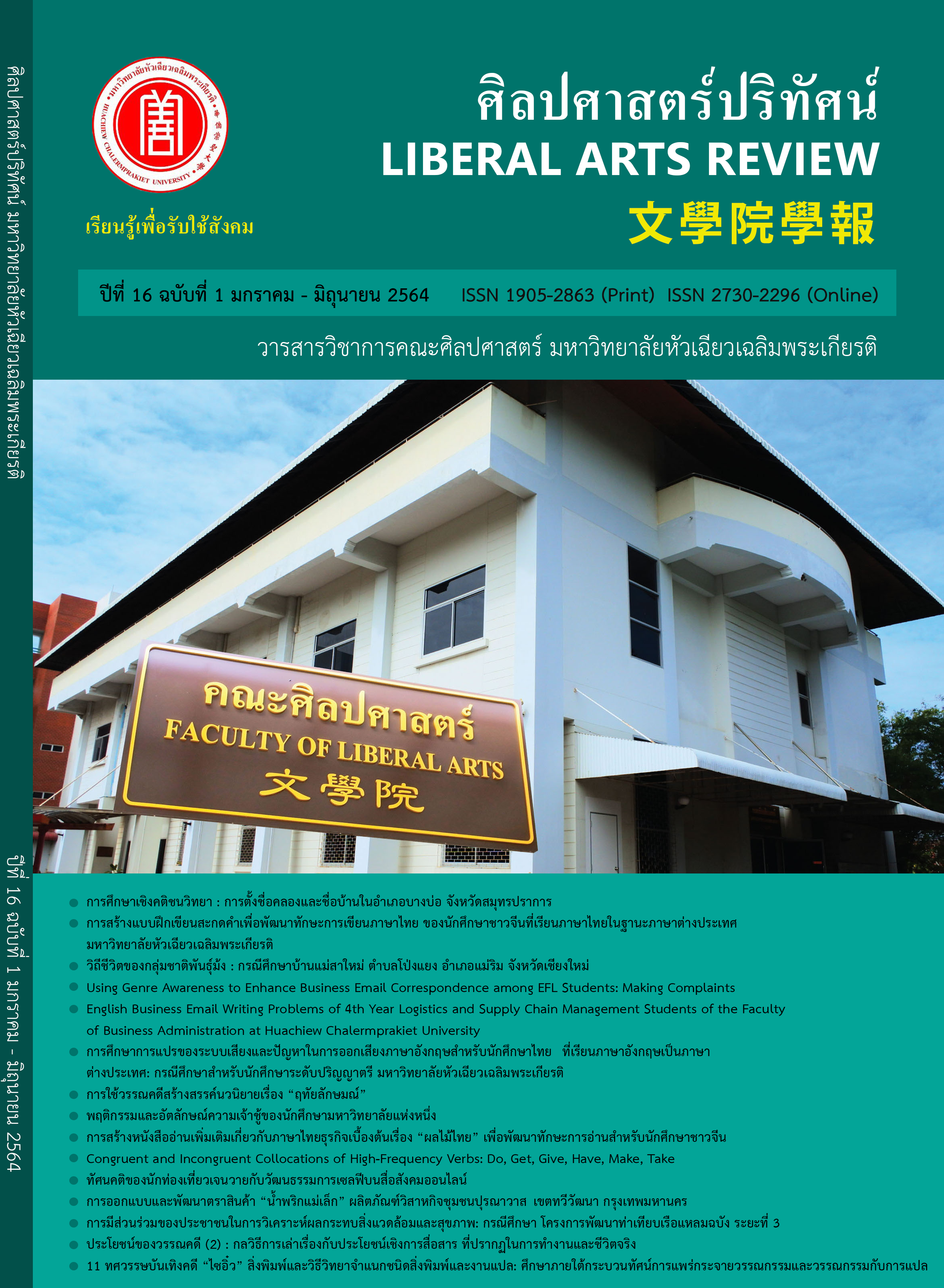Phonological Variations and Problems in English Pronunciation among Thai EFL Learners:
A Case Study of Undergraduate Students at Huachiew Chalermprakiet University
Keywords:
Phonological Variations, Segmental Phonemes, Supra-segmental Phonemes, Pronunciation Problems, Thai EFL StudentsAbstract
This paper attempts to examine phonological variations and problem sounds in English pronunciation among Thai undergraduate students. The purposes of this study were to 1) find out the English problem sounds for Thai EFL learners, and 2) investigate significant factors causing the problems in English pronunciation of those sounds. Quantitative and
qualitative methods were employed in the research design of this study. The instruments for this study were questionnaires and semi-interview forms. The samples were 20 undergraduate English-Chinese major students who enrolled EG2173 (English Phonetics Phonology) at Huachiew Chalermprakiet University. The findings from the students’ answers showed that 4 English consonant sounds, especially [θ], [ð], [tʃ], and [ʤ] and consonant clusters both at the initial and final positions were mentioned as serious problems of pronunciation at the segmental level whereas consonant linking sounds, and rising intonation patterns (2-3 level) such as in Yes-No questions were reported as serious problems at supra-segmental level. Besides, phonetic learning background was reported as the factor mostly caused problems in learning phonetics. The findings could be concluded that the differences of the sound systems between English and Thai and some factors including phonetic ability, native language, background of learning English pronunciation, teaching methodology, and motivation caused the students’ problems in English pronunciation as well.
References
Avery, P. and Ehrlich, S. (1987). Preliminary considerations in the teaching of pronunciation. London: TESL Center.
Apichatabutra, P. (2011). Thai Learner Problems: Guidelines Based on Articulatory Pronunciation . Damrong Journal of the faculty of Archaeology Silpakorn University, 10(2), 1-22.
Bada, E. (2001). Native Language Influence on the Production of English Sounds by Japanese Leaners. The Reading Matrix, 1(2), September 2001.
Creswell, J. (2002). Educational research: Planning, conducting, and evaluating Quantitative and Qualitative research. Upper Saddle River, NJ: Merrill Prentice Hall.
Ellis, R. (1997). Second language acquisition. New York: Oxford University Press.
Garrigues, S. (1999). Overcoming pronunciation problems of English teachers in Asia. Retrieved from http: //asianbridges.com/pac2/presentations/garrigues.html.
Gilakjani, P.H. (2011). A study on the situation of pronunciation instruction in ESL/EFL classrooms. Journal of Studies in Education, 1, 73-83.
Hoque, M. A. (2011). Problems of Pronunciation for the Chittagonian Learners of English: A Case Study. Journal of Education and Practice, 2(6), 1-7.
Jotikasathira, P. (1999). Introduction to the English Language System and Structure. Bangkok: Chulalongkorn University Press.
Kanoksilapatham, B. (1992). An Analysis of English Pronunciation of third Year Major Students. Nakhon Pathom: Silpakorn University Press.
Khamkhien, A. (2010). Thai Learners’ English Pronunciation Competence: Lesson Learned from Word Stress Assignment. Journal of Language Teaching and Research, 1(6), 757-764.
Sahatsathatsana, S. (2017). Pronunciation Problems of Thai Students Learning English Phonetics: A Case Study at Kalasin University. Journal of Education, Mahasarakham University, 11(4), 67-84.
Senel, M. (2006). Suggestion for Beautifying the Pronunciation of EFL Learners in Turkey. Journal of Language and Linguistic Studies, 2 (1), 111-125.
Suppasetseree, S. (2005). The development of an internet-based instructional system for teaching remedial English to first-year university students. (Doctoral dissertation). Suranaree University of Technology, Thailand.
Winitkul, D., & Ulla, M.B. (2017). Teaching English Pronunciation among Thai Engineering EFL Learners: Perceptions, Problems and Solutions. Nakorn Si Thammarat: King Mongkut’s University’s of Technology, Bangkok:, & Walailak University,
Downloads
Published
How to Cite
Issue
Section
License
บทความที่ได้รับการตีพิมพ์เป็นลิขสิทธิ์ของวารสารศิลปศาสตร์วิชาการและวิจัย
ข้อความที่ปรากฏในบทความแต่ละเรื่องในวารสารวิชาการเล่มนี้เป็นความคิดเห็นส่วนตัวของผู้เขียนแต่ละท่านไม่เกี่ยวข้องกับมหาวิทยาลัยหัวเฉียวเฉลิมพระเกียรติ และคณาจารย์ท่านอื่นๆ ในมหาวิทยาลัยฯ แต่อย่างใด ความรับผิดชอบองค์ประกอบทั้งหมดของบทความแต่ละเรื่องเป็นของผู้เขียนแต่ละท่าน หากมีความผิดพลาดใดๆ ผู้เขียนแต่ละท่านจะรับผิดชอบบทความของตนเองแต่ผู้เดียว




